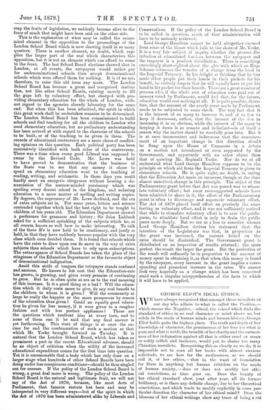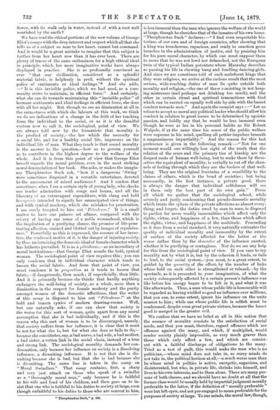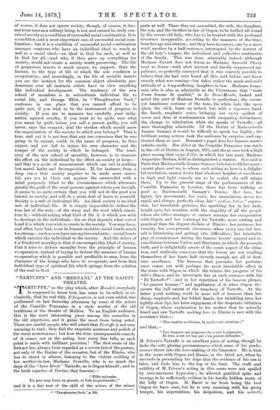GEORGE ELIOT'S IDEAL miles.
WE have always recognised that amongst those moralists of our day who adhere to what is called the Positive,— which means the Negative,—school, the school which finds the standard of ethics in no real character or mind above us, but solely in the study of human minds and human history, George Eliot holds quite the highest place. The truth and depth of her knowledge of character, the genuineness of her love for what is pure and what is noble, the breadth of her charity and the earnest- ness of her indignation against all that is either cruel or mean or softly selfish and insincere, would pat to shame too many Christian moralists. Recognising this as clearly as we do, it is impossible not to scan all her books with almost anxious solicitude, to see how far the rootlessness, as we should call it, of her ethics,—that is, the want of foundation for them in anything but human criticism on the needs of human society, — does or does not modify her ethi- cal convictions, as time goes on. Does the beauty of her ethical standard show, year after year, all its former brilliancy, or is there any definite change, due to her theoretical convictions, and which tends to modify explicitly in some par- ticular direction the character of her ethical mind? Does the blossom of her ethical writings show any trace of being a cut
flower, with its stalk only in water, instead of with a root well nourished by the earth P We have read the ethical portions of the new volume of George Eliot's essays with the deep interest and respect which all that she tells us of a subject so near to her heart, cannot but command. And it would be a great mistake to imagine that this subject is further from her heart now than it has ever been. There are plenty of traces of the same enthusiasm for a high ethical ideal in principle, which her more imaginative works have always displayed in practice. She is as profoundly convinced as ever "that our civilisation, considered as a splendid material fabric, is helplessly in peril, without the spiritual police of sentiments or ideal feelings."* And she adds, —" It is this invisible police, which we had need, as a com- munity strive to maintain, in efficient force." And certainly, what she can do towards maintaining this "invisible police" of humane sentiments and ideal feelings in efficient force, she does with all her might. But though we see no diminution at all in the earnestness with which she labours at this work, we think we do see indications of a change in the drift of her teaching from the individual to the social, or as it is the dreadful custom now to call it, the sociological, point of view. We are always told now by the humanists that morality is the product of society,—the law which the necessity for a social life, and for a healthy social life, impresses on the individual life of man. What they teach is that sound morality is the answer to the question,—how so to govern yourself as to contribute in the highest degree to the welfare of the whole. And it is from this point of view that George Eliot herself regards the moral problem, even in the most striking moral denunciation of her book. She asks, or makes the imagin- ary Theophrastus Such ask, "how if a dangerous ' Swing ' were sometimes disguised in a versatile entertainer, devoted to the amusement of mixed audiences ? And I confess that sometimes, when I see a certain style of young lady, who checks our tender admiration with rouge and henna, and all the blazonry of an extravagant expenditure, with slang and bold brusquerie intended to signify her emancipated view of things, and with cynical mockery, which she mistakes for penetration,
I am sorely tempted to hiss out Rtroleuse It is a small matter to have our palaces set aflame, compared with the misery of having our sense of a noble womanhood, which is the inspiration of a purifying shame, the promise of life-pene trating affection, stained and blotted out by images of repulsive- ness." Powerfully as this is expressed, the essence of her invec- tive, the confessed motive of it, is the danger of injuring society, by thus undermining the domestic ideal of female character which has hitherto prevailed. It is as a paroleuse,—as an incendiary of moral institutions,—that George Eliot assails the bold, cynical woman. The sociological point of view requires this; you can only condemn that in individual character which tends to loosen the social fabric. And from that point of view, you must condemn it in proportion as it tends to loosen that fabric,—if dangerously, then much ; if superficially, then little. And it is primarily because she thinks that hardly anything endangers the well-being of society, as a whole, more than a diminution in the respect for female modesty and the purity amongst women of the domestic affections, that the writer of this essay is disposed to hiss out " Ntroleuse r at the bold and brazen cynics of modern drawing-rooms. Well, but one naturally asks, if one can show that society is the worse for this sort of woman, quite apart from any moral assumption that she is bad individually, and if this is the reason why this sort of woman is to be discouraged, namely, that society suffers from her influence, it is clear that it must be not for what she is, but for what she does or fails to do,— because she constitutes, say, a bad nurse, a bad wife, a bad mother, a bad sister, a rotten link in the social chain, instead of a true and strong link. The sociological morality demands her con- demnation, only because her influence on society is a dissolving influence, a disuniting influence. It is not that she is dis- uniting because she is bad, but that she is bad because she is disuniting. The same line is taken in the essay on "Moral Swindlers." That essay contains, first, a sharp and very just attack on those who speak of a swindler as a "thoroughly moral man," only because he is faithful to his wife and fond of his children, and then goes on to in- sist that one who is faithful to his duties to society at large, even though unfaithful to his duties to those who are nearest to him,
" Theophrartas Such," p. 185.
is less immoral than the man who ignores the welfare of the world at large, though he cherishes that of the inmates of his own home. " Theophrastus Such" declares :—" I find even respectable his- torians of our own and of foreign countries, after showing that a king was treacherous, rapacious, and ready to sanction gross breaches in the administration of justice, end by praising him for his pure moral character, by which one must suppose them to mean that he was not lewd nor debauched, not the European twin of the typical Indian potentate whom Macaulay describes as passing his life in chewing bang and fondling dancing-girls. And since we are sometimes told of such maleficent kings that they were religious, we arrive at the curious result that the most serious, wide-reaching duties of man lie quite outside both morality and religion,—the one of these consisting in not keep- ing mistresses (and perhaps not drinking too much), and the other in certain ritual and spiritual transactions with God which can be carried on equally well side by side with the basest conduct towards men." And again the essayist says :—" Let us refuse to accept as moral any political leader who should allow his conduct in relation to great issues to be determined by egoistic passion, and boldly say that, he would be less immoral even though he were as lax in his personal habits as Sir Robert Walpole, if at the same time his sense of the public welfare were supreme in his mind, quelling all pettier impulses beneath a magnanimous impartiality?' And the reason for this last preference is given in the following remark :—" Not for one moment would one willingly lose sight of the truth that the relation of the sexes and the primary ties of kinship are the deepest roots of human well-being, but to make them by them- selves the equivalent of morality, is verbally to cut off the chan- nels of feeling through which they are the feeders of that well- being. They are the original fountains of a sensibility to the claims of others, which is the bond of societies ; but being necessarily, in the first instance, a private good, there is always the danger that individual selfishness will see in them only the best part of its own gain." From all which we gather that the sociological school, while severely and justly condemning that pseudo-domestic morality which treats the sphere of the private affections as almost every- thing, and forgets the duties owed by man to man, is disposed to pardon far more readily immoralities which affect only the rights, virtue, and happiness of a few, than those which affect the rights, virtue, and happiness of the multitude. Proceeding as it does from a social standard, it very naturally estimates the quality of individual morality and immorality by the extent of surface of the society affected for the better or the worse rather than by the character of the influence exerted, whether it be purifying or contagious. Nor do we see any help for this from the sociological point of view. If you care to try morality not by what it is, but by the cohesion it lends, or fails to lend, to the social system,—you must, to a great extent, be guided by the quantity of the effect, by the number of links whose hold on each other is strengthened or relaxed,—by the spectacle, as it is presented to your imagination, of what the society subsequently affected by a certain person's influence was like before his energy began to be felt in it, and what it was like afterwards. Thus, a man whose public life is honourable will be regarded as having wielded so good an influence over millions, that you can, to some extent, ignore his influence on the units nearest to him; while one whose public life is selfish must be condemned, despite even great private virtues, because the lesser good is merged in the greater evil.
We confess that we have no belief at all in this notion that the essence of morality consists in the satisfaction of social needs, and that you must, therefore, regard offences which are offences against the many, and which, if multiplied, would render society plainly impossible, as very much graver than those which only affect a few, and which are consist- ent with a faithful discharge of obligations to the many. Tried as a test of guilt, this would make the man who is no politician,—whose mind does not take in, as many minds do not take in, the political horizon at all,—a much worse man than he whose mind in politics is active, energetic, sagacious, and disinterested, but who, in private life, shrinks into himself, and lives to his own interests, and to them alone. There are many per- sons of both classes, and we should have no doubt at all that the former class would be usually held by impartial judgment morally preferable to the latter, if the definition of "morally preferable" were but left open, and not pre-engaged to mean preferable for the purposes of society at large. To our minds, the moral law, though, of course, it does not ignore society, though, of course, it doe.; not treat man as a solitary being, is not, and cannot be, truly con- ceived merely as a condition of successful social combination. It is a condition, and a most important one, of successful social com- bination; but it is a condition of successful social combination amongst creatures who have an individual ideal to reach, as well as a social ideal,—an ideal in God for each, as well as in God for all,—and who, if they gave up everything for society, would not create a society worth preserving. The life of gregarious insects is much nearer, we suppose, than the human, to the type of life of which the sole condition is co-operation ; and accordingly, in the life of sociable insects you see the instinct for the common object absolutely pre- dominant over all instincts which have in view anything like individual development. The tendency of the new school of moralists is to subordinate individual life to social life, and George Eliot, in " Theophrastus Such," confesses in one place that you cannot afford to be quite just, if you wish to be the instrument of progress to society. If you are to measure too carefully your indig- nation against cruelty, if you want to be quite sure what you mean by guilt, before you call a person guilty, you will never, says the essayist, deal the strokes which mould anew the organisation of the society to which you belong.* That is true, and yet it is not true that any one conscious that he was going to be unjust, could, in the name of progress, be thus unjust, and yet fail to injure his own character and the temper of the society to which he belonged. The tend- ency of the new school of morality, however, is to measure the effect on the individual by the effect on society at large,— and that is a mode of measurement which can end in nothing but moral laxity and decomposition. If, for instance, from a deep Pure that society requires to be made more merci- ful, you are to blaze out against the unmerciful with a mind purposely blind to the circumstances which attenuate greatly the guilt of the cruel persons against whom you inveigh, it seems to us quite certain that you will not do the good you intend, to society, and will do a great deal of harm to yourself. Society is a web of individual life. An ideal society is an ideal web of individual life. It is simply impossible to deduce the true law of the web,—of the warp and the woof which consti- tute it,—without asking what kind of life it is which you wish to develope in the individual,—for on that depends what sort of 'bond it is which you wish to create in the society. You may have, and often have had, even in human societies, social bonds much too strong,—such as you have among bees and ants,—social bonds which sacr:fice the individual to the society. And the defect of Vie Positivist morality is that it encourages this ideal of society, that it tries to deduce morality from the principle of human co-operation, instead of trying to deduce the measure of human co-operation which is possible and profitable to man, from the character of the beings who have to co-operate, and from that individual type of spiritual life which springs from the relation of the soul to God.




































 Previous page
Previous page